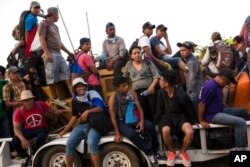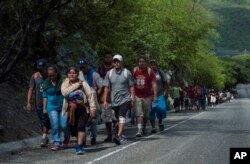As a caravan of Central American migrants continues its arduous trek toward the U.S., President Donald Trump reiterated Thursday the military would be used to prevent its entry into the U.S. from the southern border.
"I am bringing out the military for this National Emergency. They will be stopped!," Trump wrote in a post on Twitter. Trump also agreed with a border patrol labor union official that Democrats are to blame for migrants seeking refuge in the U.S.
Trump has blasted Honduras, El Salvador and Guatemala for not stopping their citizens from departing for the U.S. He said Monday he would begin cutting off or reducing foreign aid to those countries and threatened last week to use military troops to close the border.
After camping overnight in the southeastern Mexican town of Mapastepec, which is more than 1,000 miles from the closest U.S. border, the caravan was set to resume its journey Thursday.
Illness, police harassment and fear are taking their toll on the migrants, which now number between 4,000 and 5,000, a sharp decrease from the estimated 7,000 from just days earlier.
Officials say nearly 1,700 migrants already have dropped out and applied for asylum in Mexico. A few hundred weary migrants have accepted Mexican government offers to transport them back to their home countries.
The Mexican government has declined to give the migrants food, water, or even access to bathroom facilities, leaving it to private citizens, church groups or sympathetic local officials to provide essential goods, according to Associated Press.
The Mexican government has, instead, reserved these basic items only for migrants who turn themselves in at immigration centers to apply for visas or to be deported.
Sometimes Mexico's federal police have interfered with the caravan of migrants, who are mostly from Honduras, according to Associated Press.
Parents who have remained in the caravan say they are doing so for their children's futures, and out of fear of the potential dangers that would await them upon return to gang-dominated Honduras.
Honduras' homicide rate is about 43 per 100,000 inhabitants, among the world's highest for a country not at war.
Such caravans have been routine over the years without much attention, but President Trump has used the caravan to rally his Republican base before the Nov. 6 midterm elections.
Trump fueled the controversy in a series of tweets Monday, saying without evidence that "criminals and unknown Middle Easterners" were among the caravan of Central American migrants bound for the U.S.
Many in the caravan may not qualify for asylum even if they reach the border, as the U.S. does not consider escapes from poverty and certain types of violence as qualifying factors.
International law requires that individuals fleeing violence and persecution must be allowed access to the country where they are seeking asylum and the right to apply for it.
Staff from the United Nations High Commissioner for Refugees arrived earlier this week in the Mexican town of Tapachulas, which is near the Guatemalan border, to help stabilize the migrant caravan's chaotic situation and to register asylum seekers.
UNHCR spokesman Adrian Edwards told VOA that its staffers also are safeguarding migrants' rights.
“All countries have a right to be able to manage their own immigration and manage their own borders,” Edwards said. “What is important for us is that those borders are managed in an asylum-sensitive way, which means giving people access, assessing their claims and then dealing with them accordingly in line with international law.”
Trump has vowed to prevent the caravan of migrants from entering the U.S., but beyond threats to cut or reduce foreign aid, administration officials have not indicated how the U.S. will respond to what he has called a "national emergency."
















